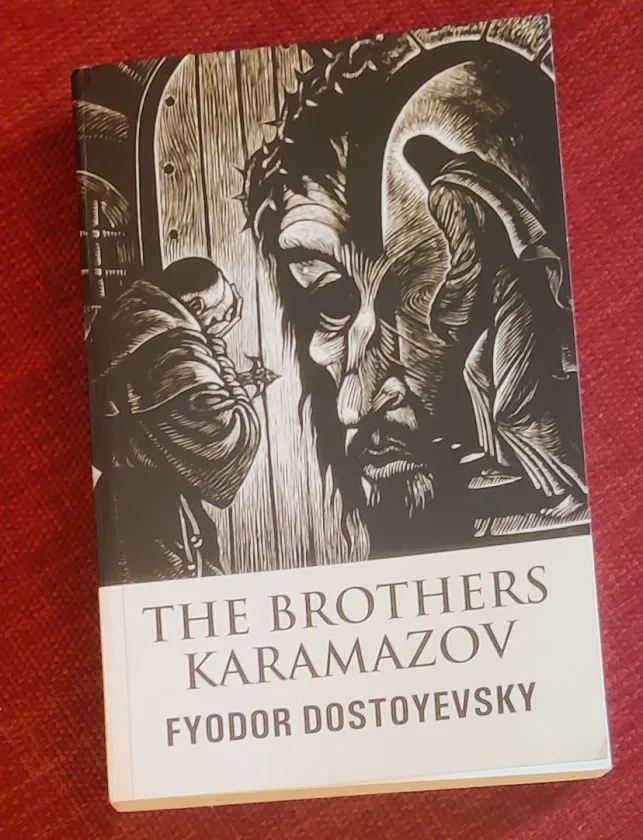
When I seek literature that is intricate and profound, I turn to the works of Dostoevsky. And this time, I picked up, “The Brothers Karamazov”.
Dostoevsky dedicated almost two years to crafting “The Brothers Karamazov,” serialized in The Russian Messenger from January 1879 to November 1880. Sadly, he passed away less than four months after its publication. This masterpiece has since been hailed as one of the paramount accomplishments in world literature.
Furthermore, Dostoevsky had plans for the narrative to unfold across additional volumes, but his premature death altered that course.
Exploring Human Behavior
“The Brothers Karamazov,” revolves around three siblings. Their imperfections, struggles, and instances of greatness is both enlightening and frustrating. The brothers – Alexei, Dmitri, and Ivan – represent fundamental aspect of human behavior. For instance, the eldest, Dmitri embodies passion, middle one Ivan stands for logic, while the youngest, Alexei symbolizes spirituality. Collectively, they epitomize the entirety of human existence – united and reliant on each other yet also causing mutual irritation.
Their father, Fyodor Pavlovich Karamazov, also has an illegitimate (fourth) son, Pavel Fyodorovich Smerdyakov, whom he employs as his servant. He becomes a central figure in the story’s unfolding events.
The book starts with a slow beginning. While, the second half of the book runs at a fast pace. It mainly hovers around the crime which is allegedly committed by either of the brothers. The brothers’ diverse responses to this event surface’s themes like:
- the repercussion of losing faith
- the emergence of humanism
- the significance of scepticism and psychology in both criminal justice and broader life experiences.
Chapters entitled, “Rebellion” and “The Grand Inquisitor”, lay the groundwork for the internal struggles both brothers face as they wrestle with questions about God, the complexities of the world, and their own existential dilemmas.
Inquisitor Questions the Notion of ‘Free Will’
“The Grand Inquisitor” presents a dialogue between a Spanish Inquisitor and Jesus, during which the Inquisitor questions the notion of ‘free will’. The compelling narrative plunges readers into profound depths.
This poem/story has been a source of inspiration for numerous existentialists. Not to miss it stands out as one of the pioneering texts to illuminate the absurdity of existence. This sentiment is encapsulated in the following quote:
“There is nothing more seductive for man than the freedom of his conscience, but there is nothing more tormenting either.”
He believes that granting humans free will was an error, leading to a state of absurd confusion. While every other living being on Earth understands its purpose, humans are left to navigate a storm of temptations, uncertain of which choices are correct.
Despite our desire to defy authority and forge our own journey, many of us are at a loss when it comes to knowing what actions to take. Since, we often struggle with knowing the right actions to take or the direction to go in.
From Sermons to Surrealism
The transition from Father Zosima’s profound sermons to Ivan’s surreal conversation with Satan is baffling to me.
Dostoevsky’s exploration of Christianity, the problem of evil, suffering, faith versus doubt, morality, values, generational sins, human psychology, and personality types is incredibly captivating and indeed emotionally stirring.
What lingers in my thoughts most prominently is Dostoevsky’s compelling argument against existentialism in favor of faith. After delving into Nietzsche‘s major works, reading “The Brothers Karamazov” makes me question Nietzsche’s views.
The Plot
The central narrative is about the murder of Fyodor Pavlovich Karamazov, a character of profound moral depravity and the father of the Karamazov siblings. However, this aspect merely scratches the surface, since the novel serves as a comprehensive exploration of Dostoevsky’s philosophical inquiries.
His eldest son, Dmitri is accused of the crime due to a complex romantic entanglement involving a young woman named Grushenka. Ivan, another son, believes Dmitri to be guilty, while Alyosha, the youngest, believes in his innocence. So, as expected, the plot moves in a dramatic courtroom, where lawyers passionately argue for justice.
As the plot progresses, it unfolds a profound examination of human nature, societal concerns of Dostoyevsky’s era, intricate character analyses, and extensive discussions on various themes such as free will, the existence of God, moral obligations, and the nature of truth.
The murder of the father of the Karamazov family, elicits little sympathy from the reader. His son Dmitri is wrongly charged and convicted of the murder, although it was actually committed by Smerdyakov. Meanwhile, he (Smerdyakov) justifies his actions by claiming that Ivan’s nihilistic beliefs influenced him to commit the murder. This complex web of events results in both Ivan and Dmitri facing accusations of their father’s murder. At the climax, Ivan descends into madness, while Dmitri is proven guilty and sentenced to twenty years in Siberia.
“The Idiot” impacted me more than “The Brothers Karamazov”
The novel is indeed filled with profound intellectual themes, highlighting Dostoevsky’s undeniable skill and depth of thought. Having said that, “The Idiot” had a greater impact on me compared to “The Brothers Karamazov.” Its effect stayed with me for a significant amount of time.
Throughout the book, (Karamazov) there are numerous instances where Dostoevsky delved into trivial details that, in my opinion, added little to the progression of the story, the creation of atmosphere, or the development of characters. For instance, Karamazovs delivering lengthy monologues to a passive audience, which elucidated no effect, no response. I often found myself zoning out and having to retrace my steps. Eventually, I felt compelled to finish the book out of my habit of not leaving a book unfinished, rather than out of genuine enjoyment.

Takeaway
I enjoy reading Russian literature because of its complex and twisted character sketches. Dostoyevsky, in particular, has this knack of peeling layers of characters and surface the hidden confused reality, which otherwise is concealed for the rest of the world.
For instance, Ivan’s self-righteousness and Dmitri’s reckless decisions make them detestable yet oddly endearing characters. For me, indecisiveness is extremely irritating and for that matter, Katerina, was indeed a source of frustration. Grushenka embodies seduction and manipulation. After all, she is full of retribution against a world she perceives as unjust. And so, she gets a sense of empowerment by her lack of remorse for the consequences of her actions. Similar nuances were seen in Nastasya Filippovna, the female lead in “The Idiot” by the same author and in Dominique Francon, the female lead in “The Fountainhead” by Russian-American author Ayn Rand.
I’d also like to add, Dostoevsky’s own life struggles underscore the importance of having a strong moral compass. The book serves as a lesson on how having the right principles can shield us from various temptations and challenges, whether they be hedonism, sexual temptations, gambling, or others. By adhering to these principles, one can lead a more fulfilling and content life.
Coming back to the book, I believe it’s worthwhile to give it a read, considering the valuable insights one can gain from exploring the works of influential authors who have shaped the literary landscape. Regardless of personal opinions, it’s undeniable that Dostoevsky’s legacy continues to endure and inspire generations of readers and writers alike.




[…] like the twin brothers in Dostoevsky’s The Brothers Karamazov, rational Ivan and spiritual Alyosha, Murakami gives us two poles of consciousness in the form of […]